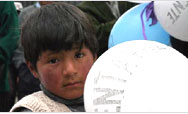Youth Profiles: Napat – Bangkok, Thailand
“Today I feel more connected to other parts of Thailand because of my education, ability to compare lives and ways of living, and my exposure to new things. I feel a sense of duty to return to Thailand one day and help my own people.”
Napat, 23, currently lives in the United States as a student at George Washington University in Washington, D.C. She is working on a Master’s degree in International Affairs with a focus on International Development.
Napat’s father owns a real estate business in Bangkok. Because her family was more affluent, she and her younger sister and brother had many advantages that other, poorer young people in the developing world have not had. These three youngsters definitely have taken advantage of their opportunities. Before coming to Washington, Napat attended university in Canada. Her 20-year-old sister lives in Thailand and attends university; her 18-year old brother is at university in New Zealand.
Describing growing up in the capital city of Thailand, Bangkok, she mostly remembers traffic. In Bangkok, roadways are clogged with cars, buses, motorcycles, and people, and it takes a long time to get around this city of narrow streets and more than 6.5 million residents. “We woke up very early, before 6 am, to start our ride to school,” Napat remembers. “The city is always very congested because of heavy traffic. It seems that children in Bangkok grow up in cars!”
Living in a crowded city, it would make sense that Napat and her friends wouldn’t think about the environment very much. Well, if you think this, you’ll be surprised at what she said.
“The immense traffic jams and air pollution were part of daily life. We city kids were aware of environmental issues, like air pollution, because they affected us directly. For children in rural areas, environmental issues such as drought and floods affected their lives more seriously because these are connected directly to agriculture, the source of their families’ livelihoods. However, we city kids were never completely disconnected from rural environmental problems. Rice paddies surrounded the city and we had a number of classes in school covering agricultural themes, including practical courses on how to grow vegetables.”
“Another environmental issue that was quite evident in daily life was water pollution. Bangkok was once referred to as the ‘Venice of the East’ because of clean water. Today, issues such as over population and congestion lead to problems with waste disposal.”
“Most children are aware of these environmental issues, no matter if you are stuck in a car or a bus intraffic, or if you are simply walking around. Everyone sees polluted rivers, air, etc. However, the schools also got involved and created campaigns to promote a better environment. “I remember one specific environmental campaign when growing up. It was a TV-based campaign called ‘The Magic Eye’ featuring a green cartoon character who taught children how to pick up garbage and how to share these messages with their parents. This campaign was quite effective because children would refer to the ‘magic eye’ watching you.”
Napat has gotten deeply involved in development issues and wants to work in this field when she has completed her education. But she has always felt she wanted to make a difference to the world. “Young children feel that they have the power to do anything within their reach. The ‘magic eye’ campaign, for instance, taught young children to talk to their parents about their environmental habits. As a child, therefore, I felt I could make a change within my family circles first.”
|


